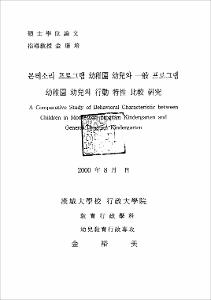몬테소리 프로그램 幼稚園 幼兒와 一般 프로그램 幼稚園 幼兒의 行動 特性 比較 硏究
- Files in This Item:
-
-
Download
 000000066046.pdf
기타 데이터 / 2.37 MB / Adobe PDF
000000066046.pdf
기타 데이터 / 2.37 MB / Adobe PDF
-
Items in Repository are protected by copyright, with all rights reserved, unless otherwise indicated.
 000000066046.pdf
기타 데이터 / 2.37 MB / Adobe PDF
000000066046.pdf
기타 데이터 / 2.37 MB / Adobe PDFItems in Repository are protected by copyright, with all rights reserved, unless otherwise indicated.